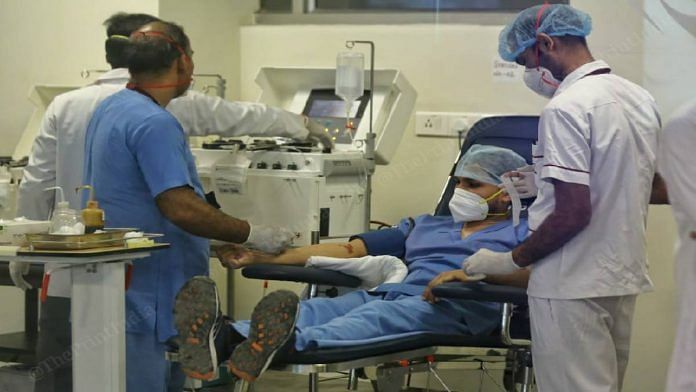Bengaluru: The United States’ drug regulatory authority, the Food and Drug Administration (FDA), Sunday authorised the emergency use of convalescent plasma therapy to treat Covid-19 patients. Convalescent plasma is the antibody-holding part of blood, which is collected from recovered patients and administered to sick ones.
Scientists, however, have sounded the alarm on the treatment. Convalescent plasma transfusion has not yet been shown to be effective through randomised controlled trials, considered the gold standard of establishing science-based evidence for drugs, vaccines, and treatments.
It is, however, widely believed to be effective. Early data had shown promising results when used early in an illness. Hospitals across the world, including most in India, regularly use plasma on patients for compassionate use as a last resort.
Plasma studies for Covid
The largest study on plasma was conducted by the Mayo Clinic, headquartered in Rochester, and was sponsored by the National Institutes of Health, the US agency for biomedical research. It enrolled 35,322 patients between April and June, and attempted to study the effect of the therapy on mortality among patients with severe Covid-19.
The study found that of those who received transfusions within three days of diagnosis, 8.7 per cent died in seven days, while among those who received it after the fourth day of diagnosis, the seven-day mortality was 11.9 per cent. In 30 days, 21.6 per cent of the first group had died as compared to 26.7 per cent of the second.
The study further found that among the different concentrations of IgG antibodies transfused, those who got the highest had a seven-day mortality of 8.9 per cent, medium concentration recipients saw it climb to 11.6 per cent, and low IgG recipients died at a rate of 13.7 per cent. Such a pattern in response is called a dose-response relationship.
However, promising as the study seemed, it was not randomised or controlled. There were no other patients to compare the effects of plasma transfusion with to ascertain whether the mortality was different among those who didn’t receive plasma. There was no placebo group as well, and everyone enrolled received the treatment.
The study had a high number of critically ill patients. Around 52 per cent were in intensive care units and 28 per cent were on ventilators. Nearly 60 per cent of the study participants were male.
Experts noted that while the authors were cautious in interpreting their results as reducing mortality for some patients when given very early, the study has not yet been peer-reviewed or published in a medical journal.
In its authorisation statement, the FDA too noted the lack of randomised trials, saying, “Covid-19 convalescent plasma does not yet represent a new standard of care based on the current available evidence.”
In India, the AIIMS director Dr. Randeep Guleria had stated that there is no evidence of benefit in mortality as seen in convalescent plasma trials.
Other small studies have shown similar results, where those receiving plasma rich in antibodies within three days of diagnosis seemed to live longer, but so far, there have been no randomised controlled trials to definitively establish that positive results were indeed because of plasma therapy and not simply better care.
Also read: Malaria drug chloroquine, used for Covid treatment, linked to amnesia, delirium, depression
Research complications
Scientists now worry that emergency authorisation would make people resort to asking for a drug treatment early rather than enrol in randomised controlled studies, worrying that they might receive a placebo.
Randomisation is performed to ensure that a group receiving the treatment and a group that is receiving placebo are roughly identical, so as to ensure elimination of other factors that could potentially influence mortality or recovery.
Studying plasma therapy poses challenges of its own, as results seem to rely on antibody concentrations in blood— something which cannot be standardised. Researchers in some places are not able to test whether plasma contains powerful neutralising antibodies due to costs and procedures.
Additionally, since compassionate use is already allowed, doctors and hospitals prescribe the plasma treatment without a proper procedure to log or collect outcomes or data.
Also read: What is ‘Long Covid’ and why some patients who have recovered continue to feel ill for months



